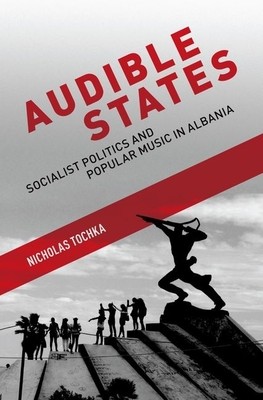
- We will send in 10–14 business days.
- Author: Nicholas Tochka
- Publisher: Oxford University Press, USA
- ISBN-10: 0190467827
- ISBN-13: 9780190467821
- Format: 15.2 x 23.1 x 1.8 cm, minkšti viršeliai
- Language: English
- SAVE -10% with code: EXTRA
Reviews
Description
During the Cold War, state-sponsored musical performances were central to the diplomatic agendas of the United States and the Soviet Union. But states on the periphery of the conflict also used state-funded performances to articulate their positions in the polarized global network. In Albania in particular, the postwar government invested heavily in public performances at home, effectively creating a new genre of popular music: the wildly popular light music.
In Audible States: Socialist Politics and Popular Music in Albania, author Nicholas Tochka traces an aural history of Albania's government through a close examination of the development and reception of light music at Radio-Television Albania's Festival of Song. Drawing on a wide range of archival resources and over forty interviews with composers, lyricists, singers, and bureaucrats, Tochka describes how popular music became integral to governmental projects to improve society--and a major concern for both state-socialist and postsocialist regimes between 1945 and the present. Tochka's narrative begins in the immediate postwar period, arguing that state officials saw light music as a means to cultivate a modern population under socialism. As the Cold War ended, postsocialist officials turned again to light music, now hoping that these musicians could help shape Albania into a capitalist, "European" state. Interweaving archival research with ethnographic interviews, Audible Statesdemonstrates that modern political orders do not simply render social life visible, but also audible. Incorporating insights from ethnomusicology, governmentality studies, and post-socialist studies, Audible States presents an original perspective on music and government that reveals the fluid, pervasive, but ultimately limited nature of state power in the modern world. A remarkably researched and engagingly written study, Audible States is a foundational text in the growing literature on popular music and culture in post-socialist Europe and will be of great interest for readers interested in popular music, sound studies, and the politics of the Cold War.
EXTRA 10 % discount with code: EXTRA
The promotion ends in 21d.05:36:12
The discount code is valid when purchasing from 10 €. Discounts do not stack.
- Author: Nicholas Tochka
- Publisher: Oxford University Press, USA
- ISBN-10: 0190467827
- ISBN-13: 9780190467821
- Format: 15.2 x 23.1 x 1.8 cm, minkšti viršeliai
- Language: English English
During the Cold War, state-sponsored musical performances were central to the diplomatic agendas of the United States and the Soviet Union. But states on the periphery of the conflict also used state-funded performances to articulate their positions in the polarized global network. In Albania in particular, the postwar government invested heavily in public performances at home, effectively creating a new genre of popular music: the wildly popular light music.
In Audible States: Socialist Politics and Popular Music in Albania, author Nicholas Tochka traces an aural history of Albania's government through a close examination of the development and reception of light music at Radio-Television Albania's Festival of Song. Drawing on a wide range of archival resources and over forty interviews with composers, lyricists, singers, and bureaucrats, Tochka describes how popular music became integral to governmental projects to improve society--and a major concern for both state-socialist and postsocialist regimes between 1945 and the present. Tochka's narrative begins in the immediate postwar period, arguing that state officials saw light music as a means to cultivate a modern population under socialism. As the Cold War ended, postsocialist officials turned again to light music, now hoping that these musicians could help shape Albania into a capitalist, "European" state. Interweaving archival research with ethnographic interviews, Audible Statesdemonstrates that modern political orders do not simply render social life visible, but also audible. Incorporating insights from ethnomusicology, governmentality studies, and post-socialist studies, Audible States presents an original perspective on music and government that reveals the fluid, pervasive, but ultimately limited nature of state power in the modern world. A remarkably researched and engagingly written study, Audible States is a foundational text in the growing literature on popular music and culture in post-socialist Europe and will be of great interest for readers interested in popular music, sound studies, and the politics of the Cold War.


Reviews